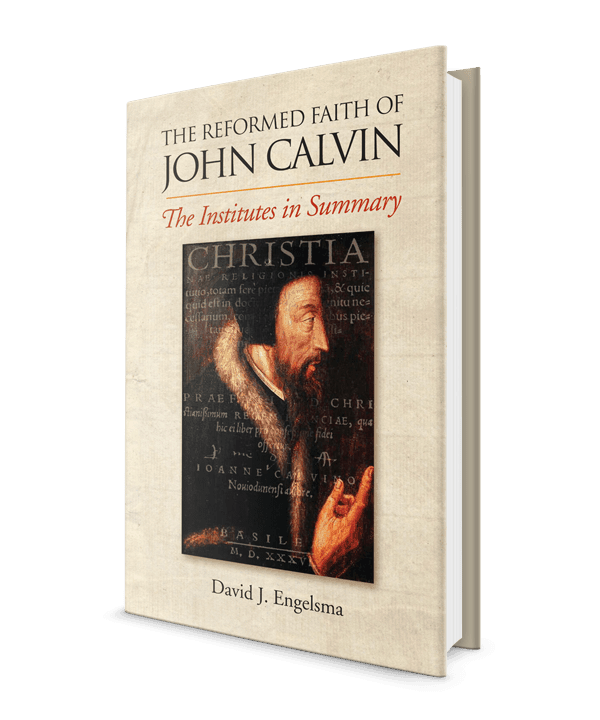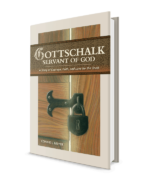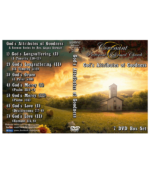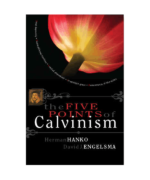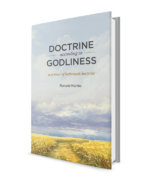As the subtitle indicates, The Reformed Faith of John Calvin is a summary (not an abridgment) in one volume of John Calvin’s Institutes of the Christian Religion. In a succinct and systematic way, this book sets forth the essence of the Reformer’s teachings in his Institutes on the great truths of the Christian religion.
Throughout, this summary of Calvin’s explanation and defence of the truths of the Christian faith is either expressed or supported by quotations of Calvin—in the judgment of the author, the most important and vivid statements of Calvin—so that the reader hears Calvin himself. One who reads this book will know the Institutes and its comprehensive, powerful instruction in the Reformed faith—the faith of the sixteenth-century Reformation of the church and the faith of true churches of Christ in the twenty-first century.
Highlights of Calvin’s doctrine in his Institutes (and thus this work by Prof. Engelsma) include the internal teaching of the Holy Spirit, providence, union with Christ, assurance, prayer, double predestination, church power, infant baptism and the Lord’s Supper. This book not only summarizes, explains and analyses Calvin’s teachings; it applies the Reformer’s instruction to contemporary doctrinal issues. It even, occasionally, becomes so bold as to critique Calvin, for instance, his teaching in Book 2 that there are remnants of good in fallen man (pp. 133-137) and aspects of his doctrine of the Trinity (pp. 83-86) and civil government (pp. 394-397).
At every point, the book provides exact reference to the Institutes in the accepted scholarly fashion, so that the reader can readily compare the summary of Calvin’s own presentation or, being stimulated, read further concerning a particular doctrine in Calvin’s great work. The Reformed Faith of John Calvin comes complete with a sketch of Calvin’s life and a treatment of the nature, style and structure of the Institutes, as well as analyses of the history of its publication and its prefatory address to King Francis I of France.
Many seminarians, pastors, elders and saints, perhaps even a theologian or two, although desirous of learning the content of the Institutes, are put off from reading it by the sheer size of the massive, two-volume work or are hindered by the demands of their calling. This summary will supply their want and, it is hoped, motivate them to read the Institutes itself. Significantly, The Reformed Faith of John Calvin was published in 2009 in commemoration both of the 500th anniversary of Calvin’s birth and the 450th anniversary of the final edition of his Institutes.
Two extracts from The Reformed Faith of John Calvin: The Institutes in Summary, by David J. Engelsma, pages 194-197 and 230-231, published by the RFPA.
_______________
Faith as Activity
Faith is not only union with Christ, but faith is also an activity. As a good teacher, distinguishing well, Calvin gives a clear definition of faith: “Now we shall possess a right definition of faith if we call it a firm and certain knowledge of God’s benevolence toward us, founded upon the truth of the freely given promise in Christ, both revealed to our minds and sealed upon our hearts through the Holy Spirit.”1
There are two main elements of faith as an activity, as Calvin points out and further explains in chapters fourteen through sixteen of book three.
The first main element of faith as an activity is knowledge. This knowledge is a knowledge of the illumined mind. The illumined mind is a mind that has been given the knowledge of God in Christ by the Holy Spirit. This knowledge comprehends the love of God in Jesus Christ for the one who thus believes. For Calvin, the knowledge of faith is more of the heart than of the mind.
Faith for Calvin is not a bare, objective, intellectual assent to the doctrine of the Christian faith set forth in the Bible. It is not the case that only when Calvin comes to the second element—trust or confidence—does faith take on the character of personal assurance of one’s own salvation. That personal assurance is already an integral part of knowledge. “What is the knowledge of faith?” we ask Calvin. His answer is that, although faith certainly is a knowledge of the teachings of the word of God, it is not such a knowledge of the teachings of the word of God as leaves it an open question whether these truths apply personally to the one who believes. Rather, it is a knowledge that comprehends the love of God in Christ for him personally: “knowledge of God’s benevolence toward us.”
Away then with that pernicious notion that has infiltrated Reformed churches, that assurance is not of the essence of faith, so that one can make a certain external confession of being a believer for thirty, forty, or fifty years but never have the assurance of his own salvation. Whatever this notion may be, it is not the teaching of Calvin.
The second element of faith as an activity is “certainty,” indeed, “full and fixed certainty” that God’s love and salvation in Jesus Christ are personally for the one who believes.2 “He alone is truly a believer who, convinced by a firm conviction that God is a kindly and well-disposed Father toward him, promises himself all things on the basis of his generosity; who, relying upon the promises of divine benevolence toward him, lays hold on an undoubted expectation of salvation.”3
Since Calvin is at home in the psalms and is familiar with all of the moods of the soul found in them, he acknowledges the struggles that believers have with this certainty. There are doubts and fears; nevertheless, not unbelief, but the certainty of faith always prevails. He uses a vivid figure of a prisoner sitting in fetters in a dark jail cell. Deprived of the full view of the sun, the prisoner can see only a few rays shining into his cell through a narrow window. Calvin concludes: “However much we are shadowed on every side with great darkness, we are nevertheless illumined as much as need be for firm assurance when, to show forth his mercy, the light of God sheds even a little of its radiance.”4
Calvin rails against “the half papist” doctrine that the Christian life is a continual alternation of faith and doubt.5 Calvin does not excuse, secretly promote, glorify, or countenance doubt in the Christian experience.
The explanation of the sinner’s confidence—not doubting—is union with Christ.
We ought not to separate Christ from ourselves or ourselves from him. Rather we ought to hold fast bravely with both hands to that fellowship by which he has bound himself to us. So the apostle teaches us: “Now your body is dead because of sin; but the Spirit of Christ which dwells in you is life because of righteousness” [Rom. 8:10]. According to these men’s [the half-papists’] trifles, he ought to have said: “Christ indeed has life in himself; but you, as you are sinners, remain subject to death and condemnation.” But he speaks far otherwise, for he teaches that that condemnation which we of ourselves deserve has been swallowed up by the salvation that is in Christ. And to confirm this he uses the same reason I have brought forward: that Christ is not outside us but dwells within us. Not only does he cleave to us by an indivisible bond of fellowship, but with a wonderful communion, day by day, he grows more and more into one body with us, until he becomes completely one with us.6
For Calvin, assurance, certainty, or confidence of salvation, including perseverance unto eternal life, is not merely of the well-being of faith. It is also of the very essence of faith. A bold confidence of salvation in the face of many sins and troubles of all kinds is what true faith is. So important is this for Calvin that he says even about the element of knowledge that “the knowledge of faith consists in assurance rather than in comprehension.”7 Calvin does not deny that faith is knowledge and comprehension, to which biblical truth the Institutes itself is a testimony, but he says that even the knowledge of faith is assurance; and, if it comes down to it, faith is more assurance than comprehension. So essential is assurance to faith that “there is no right faith except when we dare with tranquil hearts to stand in God’s sight.”8
1 Institutes, 3.2.7, 1:551; emphasis added.
2 Ibid., 3.2.15, 1:560.
3 Ibid., 3.2.16, 1:562.
4 Ibid., 3.2.19, 1:565.
5 Ibid., 3.2.24, 1:569.
6 Ibid., 1:570, 571.
7 Ibid., 3.2.14, 1:560.
8 Ibid., 3.2.15, 1:561.
_______________
Justification by Faith
That the legal act of justification is “by faith” does not mean that the faith of the sinner is a work that merits righteousness. Rather, faith is the “instrument”1 by which the sinner receives the righteousness of another, even Jesus Christ. The believing sinner receives Christ’s righteousness by way of “imputation.”2
Already in Calvin’s day the subtle error had to be combated that made faith—faith that is so important in justification—a work of the sinner that deserves righteousness, a work of the sinner upon which the sinner’s righteousness depends.
Fifty years after Calvin this would be the clever error by which the Arminian party in the Reformed churches in the Netherlands corrupted justification by faith alone, which error the Canons of Dordt explicitly condemn:
The Synod rejects the errors of those…who teach that the new covenant of grace, which God the Father, through the mediation of the death of Christ, made with man, does not herein consist that we by faith, inasmuch as it accepts the merits of Christ, are justified before God and saved, but in the fact that God having revoked the demand of perfect obedience of the law, regards faith itself and the obedience of faith, although imperfect, as the perfect obedience of the law, and does esteem it worthy of the reward of eternal life through grace.3
Calvin inveighs against the corruption of the fundamental doctrine of justification by faith that makes faith a work of the sinner that earns righteousness or makes the sinner worthy of righteousness. He denies that faith justifies by “some intrinsic power.” Rather, faith is only “a kind of vessel” to receive the righteousness of Christ: a vessel, an empty vessel that receives something from Christ. He continues, “Faith…is only the instrument for receiving righteousness.”4
Later Calvin declares, “We say that faith justifies, not because it merits righteousness for us by its own worth, but because it is an instrument whereby we obtain free the righteousness of Christ.”5 The instrumental function of faith in justification, Calvin expresses when he insists that in the matter of justification faith is “merely passive.”6
François Wendel, the astute expositor of Calvin’s thought, remarks correctly that for Calvin, “faith is nothing in itself. It acquires its value only by its content, that is, by Jesus Christ.”7 The object of faith is the word of God, and more particularly, the promise of mercy in the word of God, and more particularly still, Jesus Christ. Faith attaches to Jesus Christ. This is what gives faith its value.
The Belgic Confession confesses that faith is merely an instrument in justification: “However, to speak more clearly, we do not mean that faith itself justifies us, for it is only an instrument with which we embrace Christ our Righteousness.”8
1 Ibid., 3.11.7, 1:734.
2 Ibid., 3.11.2, 1:727.
3 Canons of Dordt, 2, Error 4, in The Confessions and the Church Order of the Protestant Reformed Churches, 165.
4 Calvin: Institutes, 3.11.7, 1:733, 734.
5 Ibid., 3.18.8, 1:830.
6 Ibid., 3.13.5, 1:768.
7 Wendel, Calvin, 263.
8 Belgic Confession, Art. 22, in Schaff, Creeds of Christendom, 3:408.
The excerpts above are also in Spanish.
“I really love the work of David J. Engelsma, The Reformed Faith of John Calvin: The Institutes in Summary. The explanations and applications are so good and easy to understand … It saddens me when people ask for books by Myles Munroe, Joyce Meyer or Kenneth Hagin yet we have gifted and biblically faithful authors like Engelsma.” – Kenya
“Professor Engelsma combines penetrating analysis with a readable style to bring out the depth of Calvin’s theological genius. Through The Reformed Faith of John Calvin I came to a much clearer understanding of the centrality of Jesus Christ in Calvin’s thought. That in itself is worth the price of the book.” – Detroit, USA
“The most electrifying book on Calvin’s theology is The Reformed Faith of John Calvin. It is short but nothing big is left out. If you want a cover to cover job on a Calvin’s theology, this is it.” – Australia
“This book is a must-read for any lover of John Calvin, Reformed theology and God’s Word itself.” – Republic of Ireland
“The book on John Calvin by Prof. Engelsma was a great read.” – Massachusetts, USA
“… this excellent and easy to comprehend summary of the Institutes by John Calvin.” – Kenya
To read a review article of this book in the Protestant Reformed Theological Journal, click here.
To read a review of this book in the Beacon Lights, click here.
To read another review of this book, click here.
To read an excerpt of this book in Italian, click here.
To watch the video of the author interview concerning this book, click here.

